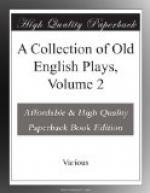Lady. Sir, I have vowd,
Since by my meanes my daughter and her love
Perishd unhappily, to seclude my selfe
From mans Society.
[Bonvil, Belisia, and Grimes discover.
Tho. Weele cancell
That obligation quickly.—Lady, I now
Will urge your promise: twas a plot betwixt us
To give them out for drownd, least your pursuite
Should have impeachd their marriage, which is now
Most iustly consummate; and[138] only I
Remaine at your devotion for a wife.
Lady. Take her,
And with me a repentance as profound
As Anchorites for their sin pay.
Sir Hu. Madam, how blest am I
To see you thus past hope recovered,
My mirth at your faire wedding shall demonstrate.
Sir Gef. I will daunce too, that[s] certain, though I breake my legs or get the tissick.
[Suc.[139] Doe you know me, Sir?
Bon. Yes, very well, sir.
Suc. You are married, sir.
Bon. I, what of that?
Suc. Nothing, but send you Joy, sir?]
Lady. But where’s my Steward? hees not hangd I hope: This mirth admits no Tragedy.
Gri. Behold the figure.
Alex. I crave forgivenesse.
Lady. Goe to, you have it.
Alex. Thanke you, madam,—I, I will goe to and goe to, and there be ere a wench to be got for love or money, rath[er] then plot murder: tis the sweeter sinn of [the two]; besides, theres noe danger of ones cragg; [the] worst is but stand in one sheet for ly[ing] in two: and therefore goe to and goe to, I [say] and I sayt agen.
Sir Gef. Bunch take my cloake, Bunch; it shal [not] be sed, so many weddings and nere a Da[nce]: for soe many good turnes the hangman ha done you, theres one for all, hey!
Tho. Well said, Sir Geffrey.
Sir Gef. Hey, when I was young! but come, we loose [time]: every one his lasse, and stricke up Musick!
Daunce.
Lady. Now, gentlemen, my thanks to all, and since [I]t is my good hap to escape these ills, Goe in with me and celebrate this feast With choyse solemnitie; where our discourse Shall merrily forgett these harmes, and prove Theres no Arraingment like to that of love.
[Exeunt omnes.
FINIS.
This Play, call’d the Lady Moth[er] (the Reformacons observ’d) may be acted. October the xvth, 1635.
WILL. BLAGRAVE, Dept. to the [Master] of the Revell[s].
INTRODUCTION TO THE TRAGEDY OF SIR JOHN VAN OLDEN BARNAVELT.
I have never met anywhere with the slightest allusion to this fine historical play, now for the first time printed from a MS.[140] in the British Museum (Add. MS. 18,653). It is curious that it should have been left to the present editor to call attention to a piece of such extraordinary interest; for I have no hesitation in predicting that Barnavelt’s Tragedy, for its splendid command of fiery dramatic rhetoric, will rank among the masterpieces of English dramatic literature.




